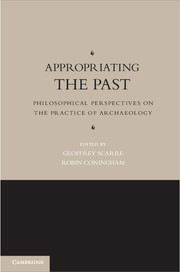Chapter 1 - Introduction
Published online by Cambridge University Press: 05 December 2012
Summary
This volume is the second in an occasional series of titles aiming to promote a constructive dialogue among archaeologists, philosophers, anthropologists, museum professionals, lawyers, and other interested parties on major ethical issues raised by the contemporary practice of archaeology. Like its predecessor volume (Scarre and Scarre 2006), it presents previously unpublished essays by several well-established writers, as well as the work of some younger scholars. The contributors come from a range of countries and disciplinary backgrounds, and they defend a variety of different, and in some cases sharply contrasting, viewpoints. It is the editors’ belief that the resulting mix of perspectives makes the volume greater than the sum of its parts and that the individual chapters not only can stand alone as valuable contributions to the debates they address but acquire a new dimension of significance when read together.
Archaeologists have commonly thought of themselves as the primary custodians and the most authoritative interpreters of the material remains of past cultures. In recent decades, however, the right of archaeologists to erect ‘Keep Out’ signs around what they conceive as the archaeological record has come under increasing challenge from other interest groups that assert equal or superior rights to access, utilise, and manage those remains, or to determine their significance. Thus, a decorated bronze vessel that for an archaeologist is principally a source of information to be extracted by standard research techniques may be, to other eyes, a sacred or taboo object, an anchor of social or cultural identity, a work of art, or a legitimate source of hard cash. These different perceptions correspond to different modes of appropriating the past, all of which are contentious in theory and in practice. As one set of stakeholders (or claimants to a stake) among others, archaeologists need to reflect on the ethical justification of their ideals and practices and to consider how best to achieve rapprochement between their own and alternative interests: a task made harder by the seemingly incommensurable nature of those interests.
- Type
- Chapter
- Information
- Appropriating the PastPhilosophical Perspectives on the Practice of Archaeology, pp. 1 - 22Publisher: Cambridge University PressPrint publication year: 2012



